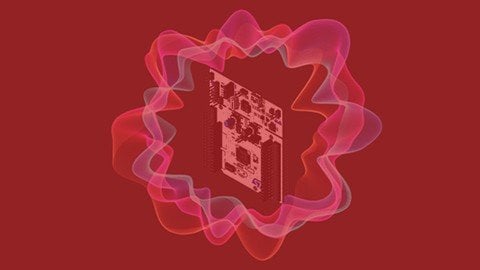
Last updated 9/2022
MP4 | Video: h264, 1280×720 | Audio: AAC, 44.1 KHz
Language: English | Size: 13.65 GB | Duration: 25h 26m
Digital Signal Processing on ARM : DFT, Filter Design, Convolution, IIR, FIR, CMSIS-DSP, Linear Systems
What you’ll learn
Develop efficient DSP algorithms using MAC and SIMD instructions
Develop RealTime Digital Signal Proceesing firmware
Understand Cortex-M4, M7 DSP optimization strategies
Master the CMSIS-DSP Library
Develop and test the Convolution Kernel algorithm on ARM Processors
Perform convolution using the ARM CMSIS-DSP Library
Develop and test the Discrete Fourier Transform (DFT) algorithm on ARM Processors
Develop and test the Inverse Discrete Fourier Transform (IDFT) algorithm on ARM Processors
Develop and test the Fast Fourier Transform (FFT) algorithm on ARM Processors
Perform Fast Fourier Transform (FFT) using the CMSIS-DSP Library
Perform spectral analysis on ECG signals on ARM Processors
Develop Windowed-Sinc filters on ARM Processors
Develop Finite Impulse Response (FIR) filters on ARM Processors
Develop Infinite Impulse Response (IIR) filters on ARM Processors
Setup Finite Impulse Response (FIR) filters using the CMSIS-DSP Library
Setup Infinite Impulse Response (FIR) filters using the CMSIS-DSP Library
Build passive Low-pass and High-pass filters
Build Modified Sallen-Key filters
Build Bessel, Chebyshev and Butterworth filters
Suppress noise in signals
Give a lecture on Digital Signal Processing (DSP)
Requirements
No programming experience needed – I’ll teach you everything you need to know.
You will need the STM32F411-NUCLEO Board
We shall be using the STM32 IDE which is FREE.
Description
Do you want to learn practical digital signal processing (dsp) without confusion?Here’s an overview of what you’re getting in this dsp on Arm processors course…Understanding the foundations of signal processing without complications:Before going on to implement practical dsp algorithms from scratch, this course teaches you the foundation of signal processing step-by-step. We shall look at key topics in signal processing including: -Signal statistics and noise -Quantization and sampling theorem -Analog filter design -Performance metrics of the Chebyshev, Butterworth, and Bessel filters -Linear systems and their properties. -Finite Impulse Response Filters (FIR) -Infinite Impulse Response Filters (IIR) -Superposition, synthesis, and decomposition. -Convolution and its properties -Discrete Fourier Transform (DFT) and IDFTDeveloping Digital Signal Processing Algorithms:We shall practically develop the signal processing algorithms we discussed in the theory class. Over here rather than use live signals we shall use some already acquired and generated signals to test our algorithms, to keep the focus on developing the algorithms and testing them, rather than signal acquisition.We shall develop the following algorithms: -Signal statistics algorithms: signal mean, signal standard deviation, signal variance -The Convolution algorithm -The Running Sum algorithm -The Discrete Fourier Transform (DFT) algorithm -The Inverse Discrete Fourier Transform (IDFT) algorithmWe shall also implement some of these algorithms using the CMSIS-DSP library and then compare the dynamic performance of our algorithm to that of the ones provided by CMSIS-DSP.Developing Drivers and Data Structures for Signal Acquisition:To be able to properly acquire signals from the external world and then apply our signal processing algorithms, we first need to develop analog-to-digital converter (ADC) drivers for acquiring the signals and appropriate data structures more storing and managing the signal. Over here we shall develop : -A bare-Metal ADC driver for acquiring the signal -A First-In-First-Out data structure for storing and managing the signal Digital Filter Design and Implementations:We shall learn about the various types of digital filters available and then go on to implement them from scratch. We shall implement: -The Moving Average Filter -The Finite Impulse Response (FIR) filter -The Infinite Impulse Response (IIR) FilterWe shall also see how to design the filter kernel of the finite impulse response filters using Matlab.Practical DSP Application on Live Signal:Over here, we shall apply all that we have learnt to process live signals from our microcontroller’s ADC.This course is more than just getting the code to work. It will teach you how to …. Write Practical DSP Algorithms WITHOUT a fancy Engineering DegreeYou will be able to understand the foundations of signal processing without the hassle of complex mathematical derivations. Taken by 3000+ Students with 200+ ReviewsThis course is the fully updated version of the 1st edition of the course. The first edition has been taken by over 3000 students with over 290 reviews. Here is what what one student had to say about the course.”The information covered in this course is exactly what I needed to learn for a new assignment. Both general information about DSP as well as how to implement things on the ARM Cortex M4.”Here is what another student had to say:”It is exciting to see how MATLAB is used in embedded systems for signal generation and filter design. The explanation here is simple and to the point. Keeps the viewer’s interest captured and avoids unnecessary details.”In summary, you really have nothing to lose. Give it a try, it comes with a full money back guarantee. Hope to see you in the course.
Password/解压密码www.tbtos.com
转载请注明:0daytown » Dsp From Ground Up™ On Arm Processors [Updated]